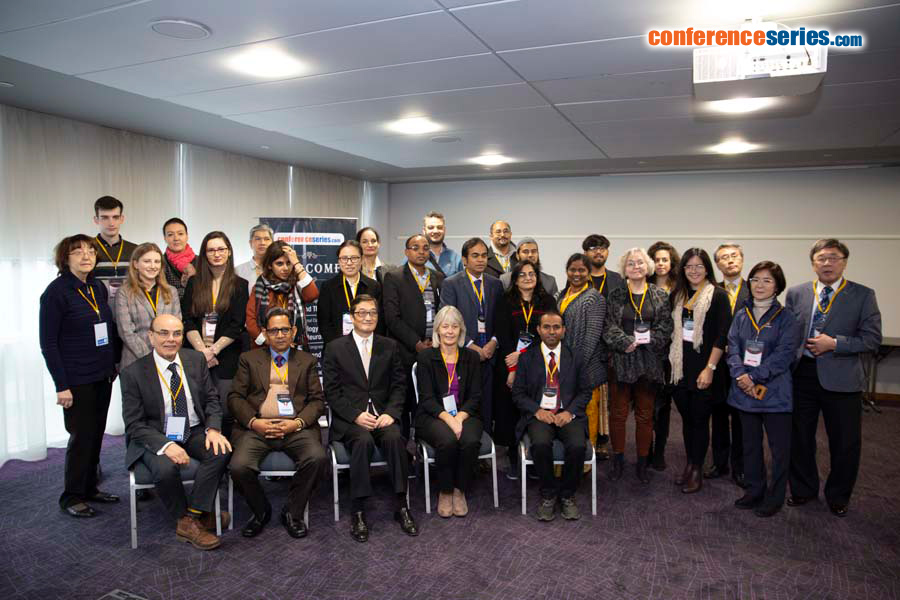
Ghada Al-Kafaji
Arabian Gulf University, Kingdom of Bahrain
Title: Defects of the mitochondrial genome in multiple sclerosis
Biography
Biography: Ghada Al-Kafaji
Abstract
The impaired mitochondrial function has been implicated in the pathogenicity of multiple sclerosis (MS), a chronic inflammatory, demyelinating, and neurodegenerative disease of the CNS. We investigated whether variants in the genes encoding mitochondrial NADH dehydrogenase (ND1-ND6 and ND4L) of complex I are involved in MS. We also investigated if mitochondrial DNA copy number (mtDNA-CN) alteration in the peripheral blood is implicated in the pathogenicity of MS and could serve as a disease biomarker.The study included 124 Saudi subjects, 60 patients with relapsing-remitting MS (RRMS) and 64 healthy individuals. Genomic DNA was extracted from peripheral blood. The mtDNA-encoded ND genes were amplified and sequenced, and the mtDNA-CN was quantified by real time PCR. Sequence analysis revealed several synonymous variants in ND genes in both patients and controls. However, four variants in the ND4 gene were identified as missense mutations in MS patients with either direct or indirect impact on complex I function. Analysis of mtDNA-CN showed that the mtDNA-CN was lower in patients than in controls. Subgroup analysis with stratification of patients based on disease duration (under or over 10 years) revealed that the mtDNA-CN was lower in the group with longer disease duration. The ROC curve analysis indicated a significant ability of mtDNA-CN to differentiate patients from controls.Our study identified four novel mutations in the mtDNA-encoded ND4 gene in Saudi patients with RRMS, which could lead to complex I dysfunction. The identified novel mutations in Saudi patients with RRMS may be ethnic-related and may prove to be significant in personalized treatment. Our study also showed that the reduction in mtDNA-CN may be an early event in MS and suggested the utility of circulating blood-based mtDNA-CN as a non-invasive biomarker for mitochondria-mediated neurodegeneration and MS, which can put forward the clinical applicability over other invasive markers. These results further confirmed the implication of mtDNA defects in the pathogenicity of MS.
Recent Publications:
1.Al-Kafaji G, Bakheit HF, Alharbi MA, Farahat AA, Jailani M, Ebrahin BH, Bakhiet M. Mitochondrial DNA copy number in peripheral blood is a novel non-invasive biomarker for multiple sclerosis. NeuroMolecular Medicine, 2020 Jan 4. doi: 10.1007/s12017-019-08588.
2.Alharbi MA, Al-Kafaji G, Ben Khalaf N, Messaoudi SA, Taha S, Daif A, Bakhiet M. Four novel mutations in mitochondrial ND4 gene of complex I in Saudi patients with multiple sclerosis. Biomedical Reports, 2019 Dec;11(6):257-268. doi: 10.3892/br.2019.1250.
3.Mohamed A, Al-Kafaji G, Almahroos A, Almosawi Z, Abdulla R, Alammadi F, Almubarak A, Al-Mahrezi A, Kamal A. Effects of enhanced environment and induced depression on cuprizone mouse model of demyelination. Experimental and Therapeutic Medicine. 2019, 18(1):566-572.
4.Hasan ZA, Al-Kafaji G, Al-Sherawi MI, Abdul Razzak R, Eltayeb D, Skrypnk C, Bakhiet M. Investigation of serum levels of leptin, ghrelin and growth hormone in Bahraini children with autism. International Archives of Translational Medicine 2019, 5(1).
5.Al-Muhtaresh H, Salem AH, Al-Kafaji G. Upregulation of circulating cardiomyocyte-enriched miR-1 and miR-133 associate with the risk of coronary artery disease in type 2 diabetes patients and serve as potential biomarkers. Journal of Cardiovascular Translation Research, 2019, 12(4):347-357.




